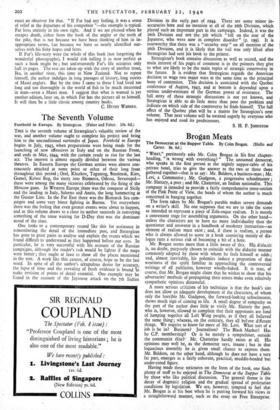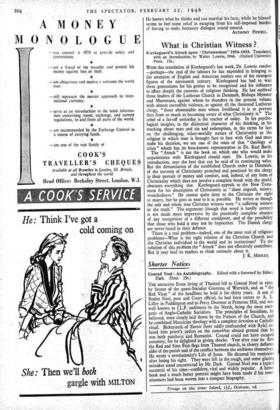Brogan Meats
The Democrat at the Supper Table. By Cohn Brogan. (Hollis and Carter. 8s. 6d.) The Democrat at the Supper Table. By Cohn Brogan. (Hollis and Carter. 8s. 6d.) " WHAT," pertinently asks Mr. Colm Brogan in Ills first chapter- heading, "is wrong with everything? " The unnamed democrat, who speaks in the first person at the nightly supper-table of his .private hotel, tries to give the answer to the two or three there gathered together—that is to say : Mr. Baldero, a business-man ; Mr. Levi, a Communist ; Mr. Gudgeon, a progressive schoolmaster ; Mr. Slattery, a poet ; and Mr. Chatterjee, an Indian nationalist. This company is intended to provide a fairly comprehensive cross-section of the Pink Point of View, the heads of whom the author is much concerned in banging together.
The form taken by Mr. Brogan's parable makes severe demands on a writer's skill. No one supposes that we are to take the scene as intended to represent a piece of Zola-esque realism. It is merely a convenient stage for assembling arguments. On the other hand— unless the characters are to have no more individuality than the questioner and answerer in a handbook of musketry instruction—an element of realism must exist ; and, if there is realism, a person who is always allowed to score in a book consisting mainly of dia- logue runs a serious risk of becoming a bit of a bore.
Mr. Brogan seems more than a little aware of this. His dialectic is, no doubt, purposely chosen to coincide with the didactic manner commonly adopted by those with whom he feels himself at odds ; and, almost inevitably, his polemics induce a proportion of that weariness of the spirit familiar in approaching the controversial writings of all publicists, however wholly-baked. It is true, of course, that Mr. Brogan might claim that he wishes to show that his adversaries' methods of propagating their tenets make even relatively sympathetic opinions distasteful.
A more serious criticism of his technique is that the book's size does not allow an adequate development of the characters, of whom only the horrible Mr. Gudgeon, the forward-looking schoolmaster, shows much sign of coming to life. A small degree of sympathy on the part of the author does little to vivify Mr. Slattery the poet, who is, however, allowed to complain that their opponents are fond of lumping together all Left Wing people, as if they all believed the same thing; whereas, on the contrary, they all believe different things. We require to know far more of Mr. Levi. What sort of a job is he in? Business? Journalism? The Black Market? Has he C.P. membership? Or is he merely a sympathiser, outside the communist elite? Mr. Chatterjee hardly exists at all. His opinions may well be, as the democrat says, insane ; but in that loquacious assembly he is given small chance to express them. Mr. Baldero, on the other hand, although he does not have a very fat part, emerges as a fairly coherent, practical, muddle-headed but under-rated figure.
Having made these strictures on the form of the book, one finds plenty of stuff to be enjoyed in The Democrat at the Supper Table by those who like political discussion. The general theme is the decay of dogmatic religion and the gradual spread of proletarian conditions by legislation. We are, however, tempted to feel that Mr. Brogan is at his best when he is putting forward his views in a straightforward manner, such as the essay on Free Enterprise.
He knows what he thinks and can marshal his facts, while he himself seems to feel some relief in escaping from his self-imposed burden of having to make hortatory dialogue sound natural.
ANTHONY POWELL.































 Previous page
Previous page